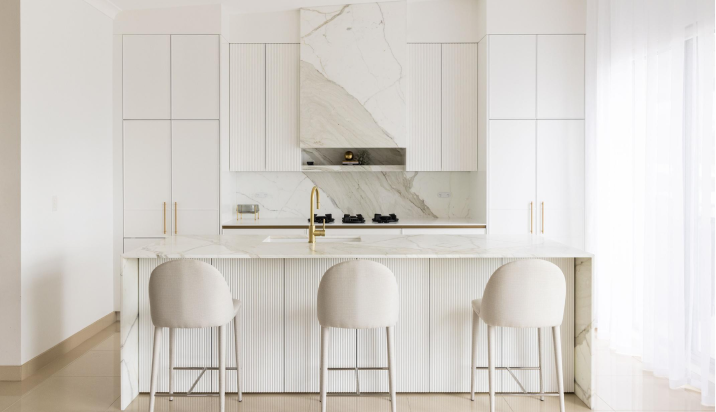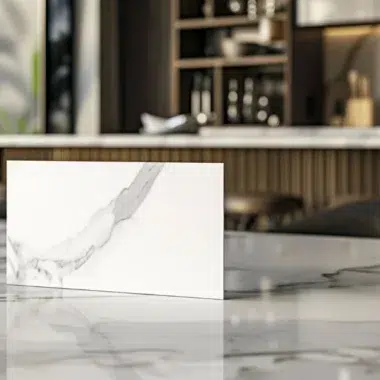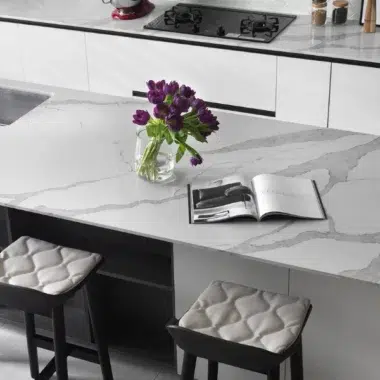Natural stone has dominated kitchen surfaces and countertops for years. This material would give a cold feel to the kitchen, timeless beauty and strength that lend a touch of class and style to any kitchen. Much like other materials, it has its pros and cons. This article seeks to give an overview of various kinds of natural stones used in kitchens, together with their benefits and possible drawbacks, to guide you toward making a proper decision for your next kitchen project.
Table of Contents
Types of Natural Stone Used in Kitchens
Natural stone has long been a choice for kitchen countertops because it personifies grace, strength, and character. Each natural stone has different advantages, so knowing them is vital in deciding on one. We’ll look at various types of natural stone used in kitchens.
Marble Slabs
Marble slabs are the epitome of luxury, sheltering in classic beauty. Veining patterns and colour variations give any kitchen marble slab a touch of elegance. Still, such excellence shows only through regular upkeep. Being a soft stone, this characteristic enables it to be carved with details, making it prone to scratches and stains. Yet, marble remains popular among those who want sophistication combined with timeless elegance.
Granite Slabs
Granite slabs are the most popular choice for kitchen countertops today because they are heat and scratch-resistant. They are available in various shades and patterns, making them suitable for every kitchen design. Since this stone is compact and dense, it gives excellent durability to the granite, making it resistant to heavy usage and perfect for any home with heavy kitchen activity.
Quartzite Slabs
Quartzite slabs are more rigid and resilient than marble; nonetheless, they vary in colour. They are remarkably resistant to heat and scratches and thus form an ideal choice for busy kitchens. Quartzite gives users the best of both worlds: marble’s aesthetic beauty with granite’s resilience. No wonder it is fast becoming the choice of everybody who wants beauty and durability combined in a kitchen surface.
Dolomite Slabs
Dolomite Slabs are highly beautiful, with a stunning combination of durability and visual appearance. They usually display soft white tones and come with wonderful veining. With an intermediate hardness between marble and granite, dolomite will present a perfect middle ground between looks and resilience. It gives emotion and quietness to any kitchen look while it’s more scratch-resistant and etching than marble, requiring medium maintenance.
Limestone Slabs
Limestone slabs are earthy and natural, added with a look that can bring out the rustic touch of any kitchen. Compared with other stones, they are softer and need more excellent care to avoid scratches and staining. Still, its kind of look can be so unique that it makes for a bold fashion statement. This stone is generally used in low-traffic areas like backsplashes and accent walls since it is among the more porous stones.
Travertine Slabs
Travertine slabs come in many earthy shades and are more or less porous in texture. As travertine is naturally soft and porous, its use is mainly restricted to backsplashes and flooring, and there are not so many countertops as it may bear heavy use in kitchens. However, with proper sealing and maintenance, travertine will give your kitchen a gorgeous, all-natural feel.
Sintered Stone Slabs
A sintered stone slab is made from natural stone powders to create a tough and non-porous surface. Due to this, sintered stone slabs are highly resistant to stains, scratches, and thermal shock, making them perfect for kitchen countertops. They combine the look of natural stone with the advantages of modern engineering, with many colours and patterns that will fit into any kitchen style.
Porcelain Slabs
Porcelain slabs are made from strong, dense clay baked at high temperatures to produce a surface that is scratch-, stain-, and heat-resistant. The colours and patterns employed on porcelain slabs are endless and different, although most have the appearance of natural stone. This makes them easy to clean and maintain, and that is what is making porcelain an increasingly popular choice for kitchen countertops.
Pros of Using Natural Stone in Kitchens
Due to related advantages, natural stone is among the most common materials used to prepare kitchen countertops and surfaces. It exudes an air of beauty, strength, and uniqueness, making it an excellent choice for traditional and modern kitchens. Here are the main advantages of using natural stone in your kitchen:
Aesthetic Appeal and Timeless Elegance
This gives a certain level of sophistication, coupled with luxury, to any kitchen. Then, there is individuality in patterns and veining unique to any marble slab or quartzite slab that can create visually striking effects not seen with synthetic materials. Such timeless beauty assures the stylish look of one’s kitchen for years to come. Each slab tells its own story with detailed, intricate details and naturally happening formations that have brought a little of the outside beauty indoors.
Durability and Longevity
Slabs made of granite, quartzite, and sintered stone have complex structures, bearing daily wear and tear without a fuss. Scratches, heat, and other types of damage will not have much effect on these materials. Many of these materials can hold their own for decades under proper care; therefore, in the long term, using natural stone will save you money by not having to constantly replace your countertops.
Heat and Scratch Resistance
One of the more prominent qualities that make granite and quartzite slabs highly coveted is their resistance to heat and scratches. You can put any hot utensils like pots and pans directly on their surface with no damage, and even cutting directly on the countertop won’t leave a mark. Natural stone is an excellent choice for a busy kitchen environment where functionality is as important as style.
Unique Patterns and Colors
No two stones are alike, so different colours and patterns are exposed. Be it the sharp veining in marble slabs or the subtle variations manifest on dolomite slabs, there is a natural stone to match each style and everyone’s taste. This makes for unmistakable character and personality in your kitchen. Natural beauty, from limestone to travertine, is bound to make your kitchen warm and welcoming.
Improves Home Value
When you install high-quality countertops with natural stone, your home’s value is visibly appreciated. Prospective buyers often associate natural stone with a high-quality finish, making your kitchen even more attractive. This makes natural stone a significant investment when trying to skyrocket a home’s functionality and resale value; porcelain slabs are not natural stones.
Drawbacks to Using Natural Stone in Kitchens
While natural stone has numerous benefits, it also has some disadvantages. Being well conversant with these cons can help you decide which materials to use in your kitchen. From expensive upfront costs to maintenance requirements, here are the disadvantages of using natural stone in kitchens.
High Initial Cost
Natural stone can be costly, especially high-end products like marble and quartzite slabs. This is not only for the material but also for professional installation. For the small-budget homeowner, this may even exceed their initial investment threshold. Likewise, high-quality granite, dolomite, and travertine slabs are costly. Thus, natural stone remains the choice of those who are looking for beautiful, long-lasting products.
Regular Sealing and Maintenance
Most natural stones, such as marble, granite, and limestone slabs, must be sealed frequently to avoid water sports and other damage. The sealing thus adds to their overall maintenance time and the cost of owning a countertop made of natural stone. The sealing will protect the look and efficiency of the stone; however, it does require periodic applications. Even less porous rocks, like dolomite and travertine slabs, must be regularly maintained for appearance and structure.
At-Risk for Staining and Etching
More porous stones, like marble and limestone slabs, tend to stain and etch due to their higher acid sensitivity. Standard kitchen spills from lemon juice, vinegar, and wine can permanently damage them if not wiped up right away. These stones are, therefore, less suitable in heavy-use kitchens where such spills are probable. Even when regularly sealed, quartzite slabs and other natural stones may undergo surface etching and staining unless well cared for.
Weight and Installation Issues
Installing may become a little difficult because stones are heavy. You will further need proper support and reinforcement to keep your countertops stable. At the same time, this can affect the type of cabinetry and supports that go into play with this material. For example, if you install a slab of granite or quartzite, you’ll need tougher, rugged cabins to help sustain the weights.
Few Repair Options
Natural stone countertops are complicated and expensive to repair in the event of damage. While minor scratches and small stains may sometimes be polished out, larger cracks or chips may require professional repair or replacement, adding to the long-term expense and headache of using natural stone. Materials like porcelain and sintered stone slabs may be more robust, but significant repairs will still have the same issues.
Conclusion
A natural stone kitchen is a choice for timeless beauty and durability, using marble, quartzite and granite slabs to boost aesthetics and home value. On the other side, however, it comes with high upfront costs, requires frequent maintenance, is easy to stain, has heavy weights, and can be challenging to install with minimal repair possibilities. Each type of stone, from dolomite slabs to sintered stone slabs, will have different pros and cons. Ultimately, what is required is something that best fits your wallet, satisfies all your needs, and fits your way of life.
FAQs
What is the Most Durable Natural Stone for Kitchen Countertops?
Granite and quartzite are among the most complex and indestructible natural stones for kitchen countertops. Both are highly resistant to heat, scratches, and daily wear, making them appropriate for busy kitchens.
How often do natural stone countertops need to be sealed?
How often a stone is sealed depends on the type of stone and its usage. In general, granites and quartzites are sealed once every 1-2 years, while other stone types, more porous like marble and limestone, seal more frequently, such as every 6-12 months.
Can natural stone countertops be repaired if they get damaged?
Small scratches and stains may be polished, while larger cracks or chips must be professionally repaired. When the damage is large, sometimes the whole section must be replaced.
Are there low-maintenance natural stone options?
Sintered stone and porcelain slabs are specifically engineered for low maintenance. These also provide excellent resistance against stains, scratches, and heat. These materials require minimum upkeep compared with more traditional natural stones.
What cleaning products can you use for natural stone countertops?
Clean with a pH-neutral cleaner specifically formulated for natural stone. Avoid acidic or harsh cleaners, as these ruin the stone’s face. In most instances, just a soft cloth and mild soap will keep your countertops clean and looking good.











